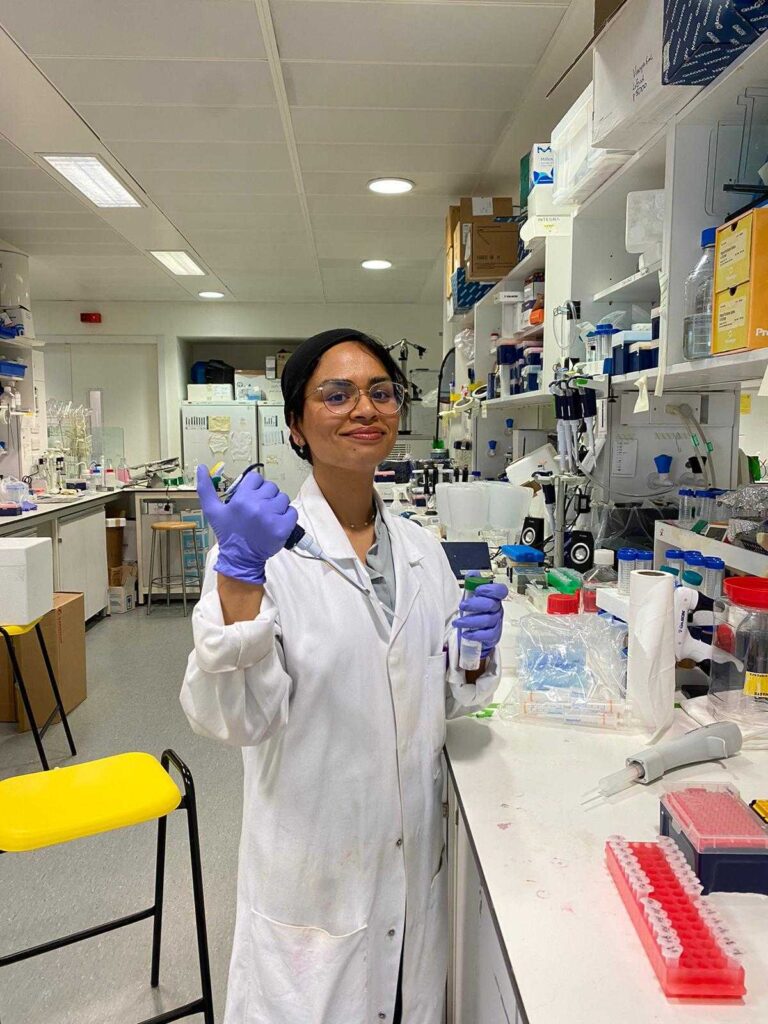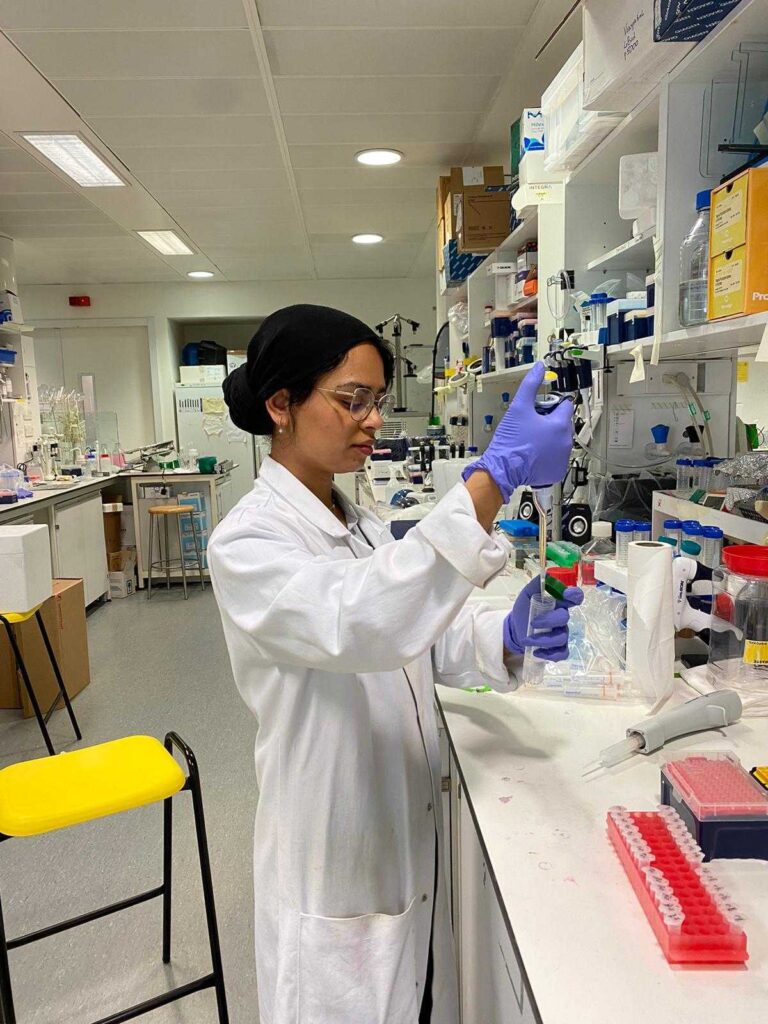In this edition of Specialist Spotlight, where we talk to members of GrantTree’s team unlocking funding for innovative companies, we speak to R&D Technical Consultant Razia Chowdry.
Not only does Razia assist companies in the life sciences space and beyond explain their complex development work to HMRC’s tax inspectors, she is also on the verge of completing her groundbreaking PhD in synthetic biology at Oxford University.
In this article, Razia reveals the awe-inspiring promise of synthetic biology, recounts her journey into this exciting field, and explains how her doctoral work has helped her demystify her clients’ complex R&D.
Razia, you’re about to complete your PhD focusing on synthetic biology. Could you tell us about your research?
The objective of my PhD was to create synthetic cells – microscopic machines programmed to carry out specific tasks – that release proteins when they’re exposed to heat.
These cells are made from a combination of biological components and artificial materials, allowing us to design and control their properties with extreme precision.
Being right on the cutting edge, my work presented its fair share of challenges. But ultimately, I was able to demonstrate that a target protein can be produced inside the synthetic cells when exposed to a specific frequency of light.
I was also able to show that the proteins can be released in a controlled manner using heat.


Razia working in her lab at Oxford University
How could synthetic cells be used to improve medical care and those suffering from disease? How large an impact could this field have on humanity’s future?
Synthetic cells have the potential to unleash huge benefits for society through a variety of applications across therapeutics, industry and scientific research.
One example use case for synthetic cells is using them to act as targeted drug delivery systems, ensuring that medications are precisely delivered to specific sites in the body – to a tumour, for example.
This maximises the effectiveness of the drug while minimising the side effects created by less targeted procedures, such as chemotherapy.
Synthetic cells also offer exciting possibilities outside the world of medicine. For example, we can engineer them to produce valuable chemicals, such as pharmaceuticals and biofuels, much more efficiently than current processes, increasing sustainability.
Life sciences is such a varied field. Why did you choose to focus on synthetic biology?
I’ve always been interested in building biological tools that harness natural systems, but I originally came to the field of synthetic biology by chance.
When I was looking for a project to focus on for my PhD, I came across the work of Professor Hagan Bayley. Professor Bayley is the founder of Oxford Nanopore, a life sciences company that has developed a novel DNA/RNA sequencing technology in an effort to democratise biological analysis. His group was embarking on interesting research related to synthetic biology, including printing tissues and communicating with artificial cells.
Through Professor Bayley’s group, I met Dr Michael Booth, who became my primary supervisor. Dr Booth’s group was focusing on controlling protein synthesis in synthetic cells using external stimuli.
I was immediately drawn to the possibility of combining fascinating ideas from biology, chemistry and physics in an interdisciplinary way, not to mention the potential of this field to revolutionise medicine.

The idea of creating and manipulating synthetic cells sounds like a fascinating and challenging concept. Can you tell us a bit about your lab work?
The great thing about my research was that I could be as explorative as I wanted to be. I worked with DNA, proteins, and lipids; employed various types of equipment and machinery; and developed novel solutions to problems by drawing on techniques and research from across the scientific spectrum.
My days in the lab generally started by setting out what I needed to do, often by analysing my experiments from the previous session. Then I’d get started preparing all the equipment, chemicals, and buffers and then conducting the planned experiments.
Working in a lab environment provided me with great insight into the need for scientific rigour in R&D. This is one of many ways my studies have helped me in my role as an R&D Technical Consultant.
Speaking of your ‘day job’, could you tell us more about what an R&D Technical Consultant is and what you do to help your clients?
Essentially, my job is to help clients explain their complex development work to HMRC’s tax inspectors, using clear, uncomplicated language that demonstrates their eligibility for R&D Tax Relief.
Submitting this information in a well-laid-out technical report increases the chance of our clients’ claims being accepted and reduces their risk of facing a time-consuming HMRC enquiry.
Like the rest of my team, I try to lean on my clients’ time as much as possible. Their time is precious and their technical teams are usually extremely busy. That’s why I build upon the initial interviews I hold with project and technical leads with my own research.
"Submitting technical information in a well-laid-out report increases the chance of our clients’ claims being accepted and reduces their risk of facing a time-consuming enquiry."
My experience in conducting scientific research in interdisciplinary scientific fields has been invaluable to my role. It gave me a broad understanding of cutting-edge science, giving me a better eye for qualifying projects which helps me ensure my clients are including all their eligible development work in their claims.
What challenges do companies face when explaining their development work to HMRC?
I have seen companies run into several challenges when writing their own technical reports.
The first is explaining their projects to HMRC inspectors, some of whom don’t have a technical background. Communicating complex scientific or technological ideas is a skill that takes time to hone. It can be especially difficult for technical people that are deeply immersed in their fields, as they’re more likely to use inscrutable language only an industry peer would understand.
Another is explaining projects in terms of the scheme’s eligibility criteria. Showing that a project centred on overcoming uncertainty en route to an advance is essential to proving its eligibility. However, it can be challenging for people unfamiliar with these terms’ unique meanings within the context of R&D Tax Relief.
A third challenge is striking the right balance between detail and brevity. Providing too much information can lead to essential details getting lost in the sea of technicalities; offering too little can make it difficult for inspectors to identify qualifying R&D.
"Communicating complex scientific or technological ideas is a skill that takes time to hone. It can be especially difficult for technical people that are deeply immersed in their fields, as they’re more likely to use inscrutable language only an industry peer would understand."
What do you like most about being a Technical Consultant at GrantTree?
I really enjoy the level of insight I have into the UK technology scheme and the many promising companies and projects within it.
I also find it extremely rewarding to help innovative businesses navigate the intricacies of R&D tax relief and unlock funding they can use to turn their ambitious ideas into magical realities. The exchange of ideas between myself and my clients adds a valuable dimension to my work.






